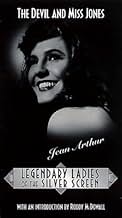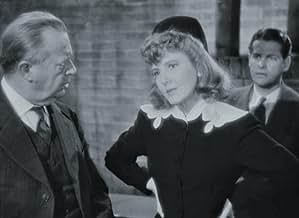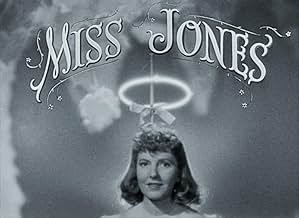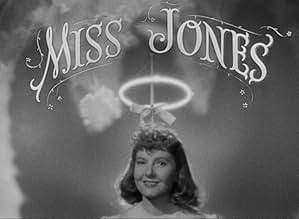IMDb RATING
7.6/10
5K
YOUR RATING
A tycoon goes undercover to ferret out agitators at a department store, but gets involved in their lives instead.A tycoon goes undercover to ferret out agitators at a department store, but gets involved in their lives instead.A tycoon goes undercover to ferret out agitators at a department store, but gets involved in their lives instead.
- Nominated for 2 Oscars
- 3 wins & 2 nominations total
S.Z. Sakall
- George
- (as S.Z. Sakall)
- Director
- Writer
- All cast & crew
- Production, box office & more at IMDbPro
Featured reviews
All aspiring and established actresses who aspire to light comedy and romantic comedy, should pay to see Jean Arthur. Simply the greatest.. She set a standard that may not be attained. She was that good. I never saw her give anything but an excellent performance And I think i have seen just about everything she did
I saw this movie for the first time on TCM, during their run-up to the 2005 Oscars. I expected quaint, cute, pleasant. What I got was much more: strong writing and characters, believable performances, a sure hand of the director who knew how to make comedy work on-screen, an interesting story with plot twists. Even after more than six decades, this comedy still works well. Today's comedy directors and writers could learn a lot from this film: how to make the situations and characters work without shoving in the audience's face. Sam Wood gives the audience for this film some credit for intelligence, and lets the strength of the script and actors emerge. For the first time, I realized just what fine actors are Charles Coburn and Jean Arthur.
10jotix100
Norman Krasna, was one of the best screen writers in the movies of the period. Sam Wood shows his ability to direct this excellent cast in one of the most satisfying comedies about the distinctions between the moneyed classes and the working stiffs they employed.
If you haven't seen the film, please stop reading now.
J.P. Merrick, is a millionaire who has investments all over New York. It is to his amazement he sees himself burned in effigy in front of the department store he has forgotten he owns. Merrick, like all people in business don't want to appear to be exploiting the workers, but this is too much! He must put an end to it.
In disguising himself as a salesman, he goes directly where the problem seems to be coming from, the shoe department. There he meets Mary Jones, who immediately feels Tom Higgins, his assumed name, is a man that is going through a rough time in his life. Mary feels pity when she realizes he doesn't know a thing about salesmanship.
In spite of everything going bad for him as a shoe salesman, Tom sticks to his new persona. He only meets kindness from all the people he is trying to fire. Merrick, by the end of the first full day at the store feels the strain of being on his feet all the time; we watch him soaking his feet in hot water, aided by his butler, George. In the process of gaining knowledge about the trouble makers, Merrick becomes human. He gets to realize how wrong he has been about a life he has lived so alienated from.
"The Devil and Miss Jones" is a movie that will delight anyone wishing to have fun. Of course, this is a film that depends totally in the two principals, Jean Arthur, who plays Mary Jones, and Charles Coburn, who as J.P Merrick/Tom Higgins shows why they were about the best actors working in the cinema in the 30s and 40s in Hollywood. Not only did they bring such class to whatever they played, but they are totally convincing. Ms. Arthur was a natural and so was Mr. Coburn.
The rest of the cast is extraordinary. A young Robert Cummings is perfect in his role as the union man. Spring Byinton, an actress that appeared in many films, is a charming Elizabeth, the woman that steals Merrick/Higgins heart. In her first scene with Mr. Coburn, she sits in the park bench to have lunch and he has nothing to eat. She gives him one of her tuna popovers and clarifies for him she paid 12 cents for the can! What times! In minor roles, S. Z. Sakall is George, the loyal butler. Mr. Sakall is a joy to watch, no matter what picture, or what character he is playing. Also, Edmund Gwenn, who probably stayed behind to played Santa Claus for the store, makes an incredible Hooper, the man in charge of the shoe department.
Thanks to Sam Wood's inspired direction this is a film that will not cease to please.
If you haven't seen the film, please stop reading now.
J.P. Merrick, is a millionaire who has investments all over New York. It is to his amazement he sees himself burned in effigy in front of the department store he has forgotten he owns. Merrick, like all people in business don't want to appear to be exploiting the workers, but this is too much! He must put an end to it.
In disguising himself as a salesman, he goes directly where the problem seems to be coming from, the shoe department. There he meets Mary Jones, who immediately feels Tom Higgins, his assumed name, is a man that is going through a rough time in his life. Mary feels pity when she realizes he doesn't know a thing about salesmanship.
In spite of everything going bad for him as a shoe salesman, Tom sticks to his new persona. He only meets kindness from all the people he is trying to fire. Merrick, by the end of the first full day at the store feels the strain of being on his feet all the time; we watch him soaking his feet in hot water, aided by his butler, George. In the process of gaining knowledge about the trouble makers, Merrick becomes human. He gets to realize how wrong he has been about a life he has lived so alienated from.
"The Devil and Miss Jones" is a movie that will delight anyone wishing to have fun. Of course, this is a film that depends totally in the two principals, Jean Arthur, who plays Mary Jones, and Charles Coburn, who as J.P Merrick/Tom Higgins shows why they were about the best actors working in the cinema in the 30s and 40s in Hollywood. Not only did they bring such class to whatever they played, but they are totally convincing. Ms. Arthur was a natural and so was Mr. Coburn.
The rest of the cast is extraordinary. A young Robert Cummings is perfect in his role as the union man. Spring Byinton, an actress that appeared in many films, is a charming Elizabeth, the woman that steals Merrick/Higgins heart. In her first scene with Mr. Coburn, she sits in the park bench to have lunch and he has nothing to eat. She gives him one of her tuna popovers and clarifies for him she paid 12 cents for the can! What times! In minor roles, S. Z. Sakall is George, the loyal butler. Mr. Sakall is a joy to watch, no matter what picture, or what character he is playing. Also, Edmund Gwenn, who probably stayed behind to played Santa Claus for the store, makes an incredible Hooper, the man in charge of the shoe department.
Thanks to Sam Wood's inspired direction this is a film that will not cease to please.
It's so full of good, common sense, compassion, wit and joy, that I can barely believe it. How depressing that this masterpiece should never be shown on TV (to my knowledge). It is not the first time that Norman Krasna has drawn my attention. This man is a genius. He writes with a total, unflagging self-assurance and perfection. This movie just cannot be improved upon. There are really no faults in it. The humor is funny without being demeaning, there is not the slightest mistake in taste or judgment. What makes it even more astonishing is that it was made during war time, when patriotism tends to cause people to become sentimental. This movie doesn't spare its country one whit. It does not include some "bad apples" among the workers. On the contrary, it implies that those who are usually referred to as bad apples are in fact the good ones! This movie is very much in the spirit of Frank Capra, and his rooting for the little man, but it outdoes Capra at his own game. There is more Capra in this movie than in all Capra movies put together. Krasna doesn't just root for the underdog, he fights his battles and he WINS! (1990 diary entry).
This is a wonderful story from the days immediately preceding America's entry into WWII, when the values that made America great were on display in the movies. A powerful department store owner, played by Charles Coburn, gets a job as a lowly clerk in his own store, in order to ferret out the workers who are trying to organize a labor union. He gradually gets caught up in the lives of the clerks in the shoe department (co-stars Jean Arthur, Bob Cummings, Spring Byington, Edmund Gwen) who accept him as just a poor, older man, and his view of things begins to shift. There are some excellent scenes in this movie, especially one in which Coburn is arrested while on a day at the beach with his fellow workers, and has to be kept out of jail by Cummings' bravado. Of course, everything works out well in the end, because this movie was made in the days when good was destined to triumph over evil.
Did you know
- TriviaJean Arthur planned to remake the picture with her as the devil titled "The Devil and Mr. Jones", but that project never materialized.
- GoofsDuring the beach scene, the people in the background change completely from shot to shot. However, the crowd in the opening shot of the beach scene is the same as the one in the final shot.
- Quotes
First Policeman: When they start recitin' the Constitution, watch out!
- Crazy creditsThe foreword after the opening credits reads: Dear Richest Men in the World: We made up this character in the story, out of our own heads. It's nobody, really. The whole thing is make-believe. We'd feel awful if anyone was offended. Thank you, The Author, Director and Producer. P.S. Nobody sue. P.P.S. Please.
- ConnectionsFeatured in Ebert Presents: At the Movies: Episode #1.12 (2011)
- SoundtracksThe Blue Danube Waltz, Opus 314
(1867) (uncredited)
Written by Johann Strauss
Played aboard ship at the end and danced by Merrick and the employees.
- How long is The Devil and Miss Jones?Powered by Alexa
Details
- Runtime
- 1h 32m(92 min)
- Color
- Aspect ratio
- 1.37 : 1
Contribute to this page
Suggest an edit or add missing content




































